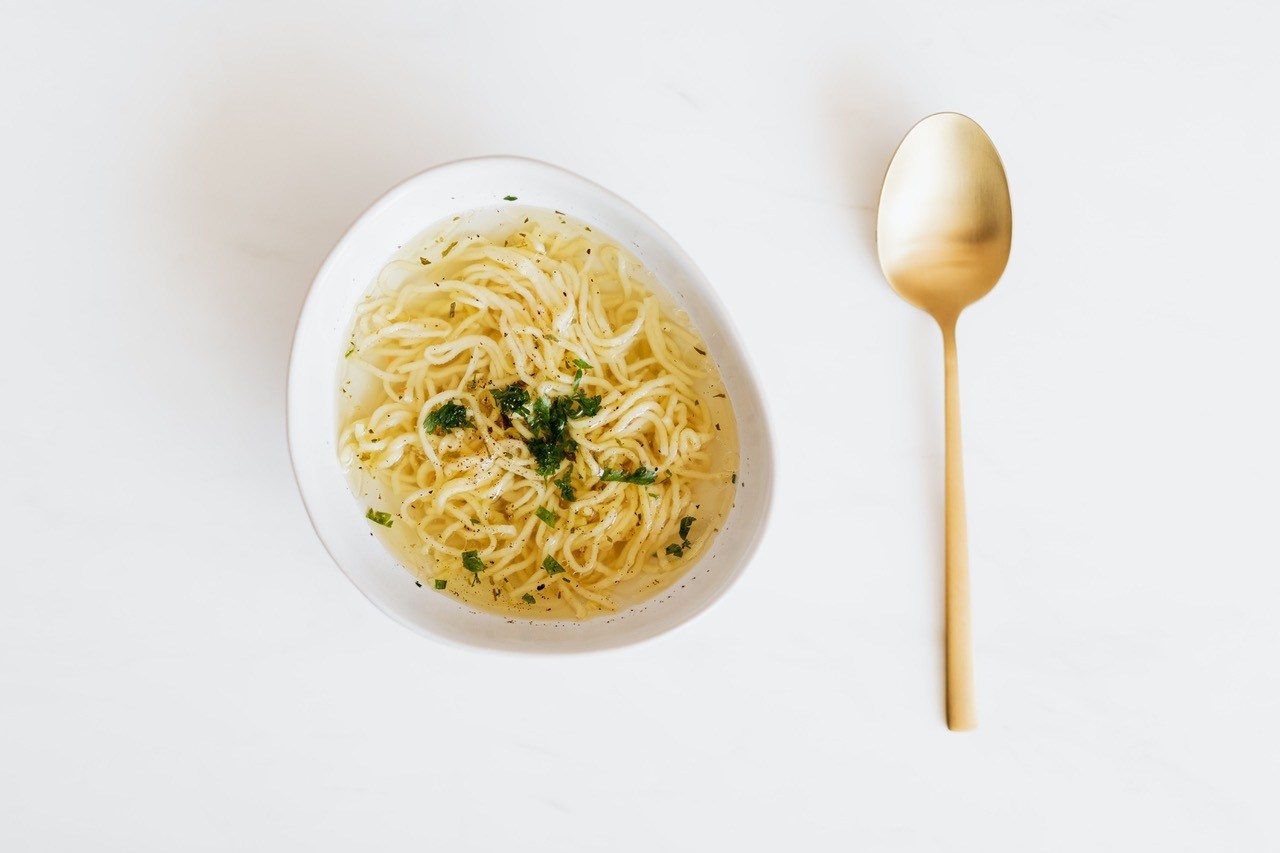They say that you are what you eat. But the fast-paced and hectic schedule of modern life has driven a wedge between ourselves and our food. Certainly, we eat, and we eat probably more than the average person in the past, but it’s become a mechanical process—eating or the act of nourishing is no longer a celebration of life and continued existence. There is no time to eat mindfully.
Quite simply, the act of putting food into one’s mouth has, for most people, become just one of the things you either do because it’s necessary or because you can’t help but mindlessly reach for something to munch on.
There’s a disconnect between our being and that which sustains us, and this discord is ultimately hurting us. We need to bring back the wholesome enjoyment of taking care of our bodies by feeding it properly, respectfully, and meaningfully. Moreover, we need to relearn how to be grateful for the opportunity to partake in the nourishment of our body.
Daftein explains why we need to rethink our relationship with food and eating by eating mindfully.
What Is Mindful Eating?
The ‘mindfulness’ movement, a way of living that emphasises being present in the moment and being conscientious of one’s actions, has branched out into various sub categories. One of which is mindful eating. True to its originating terminology, mindful eating approaches the act of nourishing one’s self as a whole, deliberate experience in the present.
To better understand what mindful eating entails, we’ve broken down our explanation into what it is and what it isn’t. Let’s start by clearing up any misconceptions that might have been picked up along the way.
What It Isn’t:
A diet fad. The first misconception of mindful eating that we must rid ourselves of is the notion that it’s a dieting fad. Eating deliberately and in the moment has little to do with counting calories or obsessing over fat, protein, and carbohydrate intake. Its goal is not to make you shed weight, though it most likely will be a side effect when one eats to savor the moment of nourishing one’s body instead of merely eating mindlessly.
A rule-based system of eating food. While eating mindfully will certainly make you be more intentional about choosing what, when, and how you eat, there are no hard rules to follow like with diets (no cutting out food groups entirely or drastically restricting portions!).
Eating mindfully is NOT an outcome-driven way of consuming food. The goal is not the end itself, but the journey towards a new perspective on living life.
What It Is:
Purposefully paying attention to the food we eat. Mindfulness, even when not in the context of eating, is all about being in the moment. That means not shoveling food into our mouths mindlessly or overindulging in drinks. Every step towards being fed—from selecting more healthy items to purchasing the food to preparing it to ingesting it—is made deliberately and maintaining that state. By focusing our entire attention on the food, we experience and truly enjoy the act of meaningful consumption of sustenance.
Focusing on one’s sensual awareness of the act of eating and drinking. Beyond making consistent and deliberate choices on what, how, and how much we eat, mindful eating emphasises experiencing the act in as much detail as possible. We take in the food, observing the effect it has on our physical body: appreciating the cut of the meat or the color of the salad as it is presented on a plate, feeling the weight of the spoon or fork as it gathers a portion just for you, anticipating the flavor profile in your mouth, actually savoring the taste on your tongue, the coming to life at the temperature of the food or beverage and how it draws a line down towards the stomach, enjoying how your appetite is sated—this behavior puts you in the exact moment of the act, allowing you to truly appreciate being.
Consuming food without judgment. We’ve been conditioned to think about food and eating a certain way—sometimes positively, something unhealthily, and mostly negatively. Mindful eating does away with passing judgment on the thoughts, feelings, and conditioned bodily reactions you might have as you nourish yourself; the in-the-moment exercise is all about experiencing the sensory signals your body sends you, full stop. A mindful eater takes in the taste of the food, the satisfaction it brings, and the fullness at the end wholeheartedly. But more than just simply acknowledging the sensory input, a mindful eater embraces the act of consumption and celebrates their ability to put sustenance into their bodies. Non-judgment can also be practiced in the way we buy, prepare, and serve the food.
In a nutshell, mindful eating is a process-based way of connecting with the act of eating and drinking. It isn’t about checking a list and being perfect; it isn’t about always eating the correct and recommended things; nor is it about establishing rigid rules and restricting your diet. It’s about making your peace with what you consume and being present—in the moment—as you go about shopping for, preparing, serving, and eating your food.

Mindless Eating
The complete opposite of mindful eating is mindless eating. It happens when we don’t take the time to truly appreciate the act of consuming a good meal and nourishing our bodies. Unfortunately, for many of us, mindless eating informs our way of relating to food. Due to our busy daily lives, we often cut corners rushing from one thing to the next.
Mealtimes are often a casualty of such a way of life and they end up rushed affairs that we barely taste or even remember: we gobble up a sandwich while driving or commuting to work, reach for some fast food delivered to your door while sitting in front of a computer screen, or park ourselves on the couch to multitask eating and watching a stream.
And, endlessly between mealtimes, we snack—even if we weren’t even hungry in the first place. Eating mindlessly is turning what should be a sensory celebration into an unhealthy habit of disconnecting ourselves from the world. We end up eating to:
- Distract from difficult emotions—sadness, loneliness, anxiety—that we don’t want to face or work through
- Relieve stress through a convenient but unreasonable avenue
- Momentarily alleviate a sense of boredom or restlessness
Eating for a More Balanced Lifestyle
At the end of the day, eating mindfully, maintaining a state of being in the present takes work and discipline. It is, after all, the polar opposite of mindless eating. But it isn’t also about following a rigid regimen of what and what not to eat. It is always going to be about your decisions and what you can handle at the moment. So if full time mindfulness isn’t for you, or you just want to ease your way into the practice, then go for it.
You can opt to eat this way for a couple of meals a week or with all your meals. The most important aspect of this is that you make time to truly experience and celebrate the act of nourishing yourself as you do so. As you get used to eating with all your senses ‘present,’ you become more attuned to your body and its signals—when it’s hungry, when it lights up from the taste or smell of a favorite dish, and when it’s satiated.
Becoming more aware of what your body is trying to tell you helps you refrain from overeating and consciously move away from unhealthy dietary habits to enjoy the benefits of a more wholesome one. Other advantages of a more mindful approach to eating are:
- Improved digestion
- Enhance enjoyment of food
- Improved mood
- Better portion control
When you learn how to pay close attention to the sensory details of before, in the middle of, and after eating, you’ll be able to savor each mouthful’s tastes and textures; identify when your body is actually hungry and not looking for something to ‘mindlessly’ do; stop before you feel too full; and appreciate how certain foods affect the way you feel and your energy levels.
Become a Mindful Eater
We’ve already covered that eating mindfully is eating with awareness of the act itself. You can’t let inattentiveness rule you when being mindful—no watching TV or playing on your phone, no daydreaming or thinking about what you need to do later. No eating on autopilot either.
When you’re just beginning, there’s no need to expect perfect. In fact, there’s no need to expect perfection at all even in the long run. Several external factors may grab our attention and we’ll have to deal with it, after all. The key is seamlessly getting back on track. So, if you want to eat deliberately, you’ll have to recognise the signs that your attention is drifting or that something is going to distract you, and learn how to gently stir yourself back.

You can start shifting your mindset and behavior by practicing mindful eating in short spurts, like five minutes at a time. When you get used to it, you can build up and lengthen your times from there. We’ve included some guidelines that you can use to model your own mindful eating practice:
Center Yourself. We’ve all got to start somewhere, and it’ll be easier when you deliberately signal to your body that you’re going to practice being a mindful eater. We suggest focusing on your breaths. Doing so doesn’t require any tools or extra knowledge; you just have to think about how your draw air into your lungs, retain them for some seconds, then exhale.
Do a Hunger Checkup. The best way to come into a mindfulness meal is hungry, but not the type where you’re ravenous because you skipped a meal or two. So, do a hunger checkup before partaking in a meal and ask yourself why you’re reaching for food. Are your intentions simply to satisfy your physical need for sustenance? Or are you just bored and looking for something mindless to occupy yourself? Perhaps you’re merely reacting to a bad experience and are trying to distract yourself with comfort food? When you want to be deliberate about eating then you have to honestly answer why you want to engage in the act.
Apply All Your Senses. Taste is obviously the most used sense while eating, with smell a close second. But in limiting yourself to only experiencing your meal with just those two senses is a disservice to you and counterproductive to the mindfulness movement. Feast your eyes on the dish in front of you, consider the colors: are they fresh and light? Are they darker toned, giving an impression of heavy and rich flavors? Consider the shape of things! Use your fingers, perhaps, and your tongue to explore the different textures in your meal. Finally, don’t let your auditory senses be left out: surprise yourself with the crunch of a crisp salad or listen to the sound of your throat swallowing. There’s so much to experience in a single meal when you apply all your senses to the activity.
Observe and Acknowledge Reactions. As you use the senses available to you to the act of partaking in a meal, pay close attention to the reactions the food elicits from you. Observe how the warmth of soup goes down and settles in your stomach. Does the heat spread throughout your body until you can feel it at the tips of your toes? Or does it whet your appetite for more of that flavorful broth? However your body reacts or feels is your own. As a mindful eater, your task is to acknowledge those reactions without passing judgment.
Pay Attention to Shifts. The experiential nature of nourishing yourself with a meal isn’t fixed; it’s ever changing and evolving as we go from hunger to satiety and back to hunger again. So pay particular attention to where you are on the scale at any given moment. Don’t push it—feel your body getting full, feel it as the food and drink satisfies that basic human need. Only listen to the demands of your body to know when it’s finally full and you should stop eating.
Switch to Eating Mindfully
Learning to be present and in the moment when eating can help manage food cravings, improve the overall quality of your diet, and enhance your sensual enjoyment of the act of nourishing yourself. If you’re ready to make the switch to a more mindful way of eating, get in touch with Daftein’s nourishment mentor. We can help set you on the right path towards conscientious food consumption.






